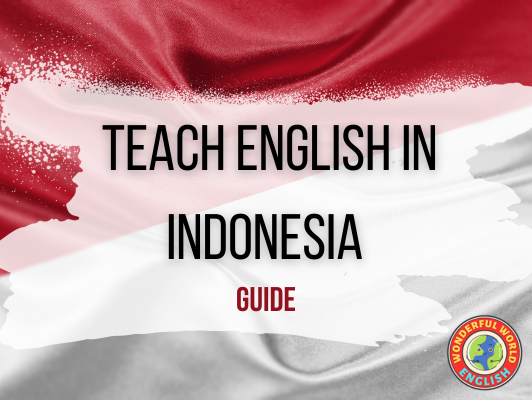Contents
Toggle
Meet David De’ Ath, co-founder, editor, and writer at Wonderful World English. With his extensive background as an English teacher, David provides valuable insights and practical tips on ESL for students and teachers alike.
Indonesia, known for its beautiful landscapes and rich cultural heritage, has always captured the interest of people worldwide.
The variety of languages and traditions present here offers a unique experience, especially for educators interested in teaching English.
As Indonesia makes strides towards global recognition, the desire to learn English among its citizens is growing.
This trend is creating numerous opportunities for English as a Second Language (ESL) teachers.
If you are an ESL teacher considering a position in Indonesia or are simply curious about the prospect, you’re in the right place!
Obtain a bachelor’s degree and a TEFL certificate to teach English in Indonesia. Find a teaching position, then secure a work permit and visa, with a simpler process for ASEAN citizens. Embrace the culture and learn Bahasa Indonesia to enhance the teaching experience in this diverse nation.
I am an experienced ESL teacher, and I have put together this guide to help anyone interested in teaching English in this Southeast Asian nation.
Today, we will delve into the steps and requirements for teaching English in the beautiful islands of Indonesia.
Let’s dive in!

Teaching English in Indonesia
English is known as the global language, important for business, travel, and learning.
It opens doors to more jobs and opportunities in many countries, including Indonesia.
Indonesia sees learning English as a way to grow and connect with the world.
People here are interested in English-speaking cultures and see knowing English as a chance to advance in many areas of life.
So, there’s a growing need for English teachers in Indonesia.
While it might not be as famous for hiring English teachers as some other countries, there are still many chances for those who are qualified.
Now, let’s explore what’s needed to teach English in Indonesia:
1. The Indonesian Education System
Understanding the education system of Indonesia is pivotal for ESL teachers as it provides a glimpse into the teaching environment they are about to step into.
The structure and curriculum at different levels of education mirror the nation’s commitment to fostering a learning environment that caters to the diverse needs and aspirations of its students.
The Indonesian education system is a reflection of the country’s dedication to nurturing a learned society, ready to step onto the global stage.
For ESL teachers, understanding this system will help them align their teaching methods and appreciate Indonesia’s learning culture.
Here’s a closer look at the different stages of education in Indonesia:
Primary Education (Usia Sekolah Dasar)
The journey of formal education begins with primary schooling, which spans six years.
This phase lays the foundational stone for acquiring basic knowledge in various subjects, including Bahasa Indonesia, Mathematics, and Science.
The curriculum is designed to ignite curiosity and a love for learning in young minds.
At this stage, students are introduced to the basic principles of education that will support their academic journey.
Secondary Education (Usia Sekolah Menengah)
Secondary education is a significant phase that bridges primary education and higher education.
This stage is divided into two parts: lower secondary, which lasts for three years, and upper secondary, also spanning three years.
Lower Secondary
Here, students are exposed to a broader spectrum of subjects, building on the knowledge acquired during their primary years.
The curriculum becomes more diversified to provide a well-rounded education.
Upper Secondary
The curriculum further evolves, and English is introduced as a crucial subject, reflecting the country’s aspiration to integrate with the global community.
The emphasis on English education paves the way for ESL teachers to contribute to the learning ecosystem of Indonesia.
Higher Education
Indonesia hosts a variety of institutions under its higher education umbrella, including Universities, Academies, Polytechnics, and Institutes.
These institutions offer a vast array of fields and specialties, catering to students’ diverse academic and professional aspirations.

2. Qualifications
Embarking on a teaching journey in Indonesia necessitates meeting certain qualifications to ensure that educators are well-equipped to contribute positively to the learning environment.
Here’s a detailed look at the qualifications required to teach English in Indonesia:
Bachelor’s Degree

Holding a Bachelor’s degree is fundamental for aspiring ESL teachers aiming to teach in Indonesia.
Although the degree does not have to be in a related field, having it in English, Education, or a related discipline can be advantageous.
This requirement ensures a basic level of education and knowledge, which is crucial for maintaining the standard of education in the classroom.
TEFL Certification

A TEFL (Teaching English as a Foreign Language) certification is significant for those looking to teach English in Indonesia.
This certification equips educators with the skills and methodologies needed to teach English to non-native speakers effectively.
Other equivalent certifications, such as TESOL (Teaching English to Speakers of Other Languages) or CELTA (Certificate in Teaching English to Speakers of Other Languages), are also recognized.
These certifications provide a foundation in teaching methodologies, classroom management, and understanding the nuances of language learning and teaching.
To discover the differences between these three qualifications, check out the link below!
Related Article: CELTA vs. TEFL vs. TESOL: Which One is Best?
Teaching Experience (Advantageous, Not Mandatory)

While having prior teaching experience is not a mandatory requirement, it can be a substantial advantage in the competitive teaching market of Indonesia.
Experience in teaching showcases an educator’s capability in managing a classroom, creating effective lesson plans, and dealing with the challenges that come with the teaching profession.
Schools might favor candidates with teaching experience as it often translates to higher confidence and effectiveness in the classroom.
Other Considerations
- Language Proficiency: Besides English, having a basic understanding of Bahasa Indonesia can be beneficial for interaction and engagement with students and staff.
- Cultural Awareness: Being sensitive to and having an understanding of the Indonesian culture can enhance the teaching experience and help build a positive rapport with students and colleagues.
- Professional Development: Engaging in ongoing professional development can also be seen as a positive trait. It showcases an educator’s commitment to continuous learning and adapting to new teaching methods.
These qualifications and traits are geared towards ensuring that ESL teachers are well-prepared to contribute to the educational landscape in Indonesia.
Meeting these qualifications not only aligns with the regulatory framework but also enhances the quality of education delivered to the students, thereby making a positive impact on their academic journey.

3. Legal Requirements
Navigating the legal landscape is crucial for ESL teachers planning to teach in Indonesia.
Understanding and adhering to these legal requirements is fundamental for a hassle-free experience while embarking on your teaching journey in Indonesia.
It’s always advisable to liaise with your employing institution and possibly seek legal advice to ensure full compliance with the Indonesian law, paving a smooth path for your teaching venture in this culturally rich archipelago.
The process varies slightly for ASEAN and non-ASEAN citizens, each with its own requirements and procedures. Here’s an expanded view of the legal requisites:
For Non-ASEAN Citizens:
Work Permit and Visa
Acquiring a work permit and a visa is a fundamental step for non-ASEAN citizens aiming to teach in Indonesia.
The work permit authorizes foreign nationals to work in the country, while the visa allows entry and stay in Indonesia for the duration of employment.
Employer Assistance
Often, the school or educational institution employing you will assist in the process of obtaining the necessary work permit and visa.
They may have a designated staff or a legal team to guide you through the bureaucratic maze.
Documentation
Essential documents required for this process include:
Valid Passport
Ensure your passport has adequate validity, preferably beyond the duration of your employment contract.
Employment Contract
A formal agreement between you and the employing institution detailing the terms of employment.
Criminal Background Check
Some institutions or Indonesian authorities may require a criminal background check to ensure you have no criminal record.
This can usually be obtained from the police department in your home country.
Processing Time
The time taken to process work permits and visas can vary, so it’s advisable to start the process well in advance of your intended start date.
There are several great destinations that ESL teachers flock to within Asia.
For guides on how to teach in some of these nations, check out the links below!
How to Teach English in Thailand (2024) How to Get Started
How to Become an English Teacher in Korea – Full Guide
How to Become an English Teacher in China in 2024

For ASEAN Citizens:
Simplified Process
Thanks to regional agreements, the process for ASEAN citizens is somewhat simplified, making obtaining the necessary permissions to work in Indonesia easier.
Registration with Local Authorities
Even with a simplified process, registration with local authorities is essential.
This registration helps legalize your stay and work in Indonesia and ensures that you comply with local laws.
Documentation
Similar to non-ASEAN citizens, having a valid passport and an employment contract is crucial.
The documentation requirements might be less stringent, but checking with the employing institution or local Indonesian embassy for precise details is advisable.
Employer Assistance
Employers often assist ASEAN citizens as well in navigating the legal requirements, ensuring a smooth transition into the Indonesian working environment.

Finding Teaching Opportunities
Indonesia offers a variety of teaching opportunities.
Before diving into the job search, ensure your documents are in order, your CV is updated, and you are well-prepared for interviews.
Let’s delve into the avenues available for finding teaching positions in Indonesia:
1. Language Schools:
- Indonesia has a good number of language schools seeking English teachers.
- This is a favorable option for newcomers in the teaching field, providing a platform to teach students of different ages.
- The work hours can be flexible, often during evenings and weekends.
- You can search for job openings on online platforms such as Dave’s ESL Cafe, TeachAway, or ESL Jobs.
2. Public Schools:
- Teaching in public schools is another viable option, though proficiency in Bahasa Indonesia may be preferred to better communicate with the school community.
- Positions here offer a more structured work environment and the chance to immerse in the local education system.
- Look for openings on local job portals or contact schools directly to inquire about vacancies.
3. International Schools:
- International schools in Indonesia often seek qualified and experienced ESL teachers.
- These institutions offer competitive salaries and a multicultural work environment.
- Websites like Search Associates or the school’s own websites are good places to look for job openings.
4. Universities:
- For those with a higher degree of expertise and experience, teaching at a university level can be a rewarding experience.
- Positions may be limited but offer a chance to engage with adult learners and contribute to higher education.
- Check university websites or platforms like HigherEdJobs for available positions.
Networking with other teachers or joining expat communities in Indonesia can also lead to job referrals and openings.
Platforms like LinkedIn or expat forums can be useful in connecting with others in the teaching field in Indonesia.

Tips for Teaching English in Indonesia
These steps not only enrich your teaching experience but also build a positive and respectful relationship with the local community and your students:
1. Learn Bahasa Indonesia
Learning basic phrases in Bahasa Indonesia can make daily talks with students, staff, and locals easier and shows respect for their culture.
It’s good to join a language course, and using online platforms like Duolingo or going to local language schools can help.
Practicing by talking with locals can improve what you’ve learned and make you feel more connected to the community while teaching in Indonesia.
This is also considered the easiest Asian language for English speakers to learn!
For a list of the top 12 easiest Asian languages, check out the link below!
Related Article: What is the Easiest Asian Language to Learn? (Top 12)
2. Embrace the Culture
Joining local events, festivals, and community activities can help you understand Indonesian culture better and build good relationships with the community.
It’s important to learn and respect local customs and traditions, which your students and colleagues will appreciate.
During your free time, explore Indonesia’s cultural landmarks, traditional markets, and natural wonders to appreciate the country’s rich heritage more.
This will not only enhance your understanding but also make your teaching experience in Indonesia more enjoyable.

Conclusion
Teaching English in Indonesia can be a thrilling adventure full of cultural discoveries and professional growth opportunities.
It may have its challenges, but the rewards and experiences you gain are enriching.
With the right qualifications and a love for teaching, Indonesia could be a great place for your next teaching adventure.
This guide aims to help those interested in teaching English in Indonesia.
Your journey in teaching can be filled with joy as you not only impart knowledge but also explore the beautiful culture and traditions of Indonesia.
The friendships you make with students, colleagues, and locals, and the memories you create exploring the country’s natural and cultural wonders, will be cherished long after your teaching stint ends.
As you prepare for this journey, having the right qualifications is essential.
Your passion for teaching and eagerness to learn will also play a big role in making your experience enjoyable and fruitful.
So, as you step forward towards this exciting teaching expedition in Indonesia, we wish you Selamat Berjalan (Safe Travels)!
Image Attribution: All images licensed via canva.com





